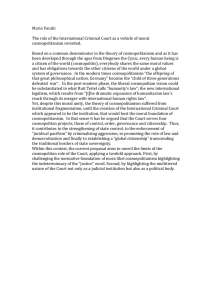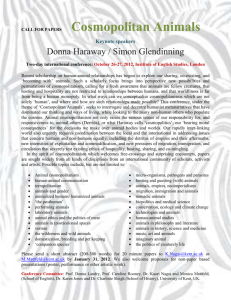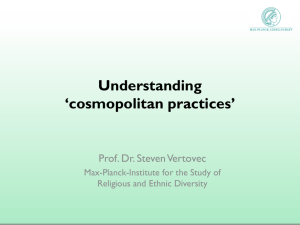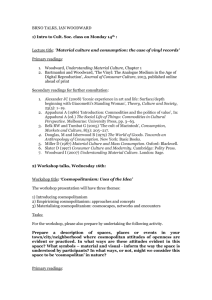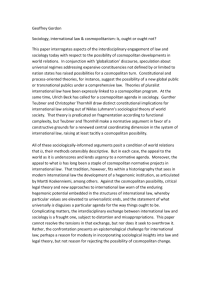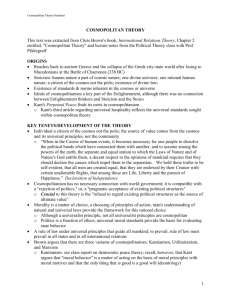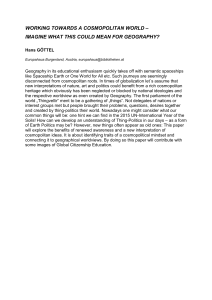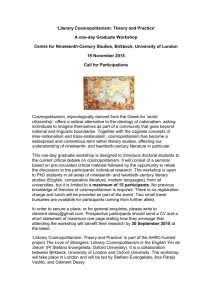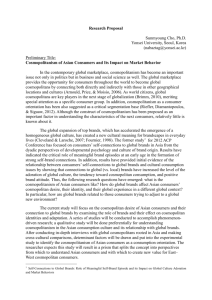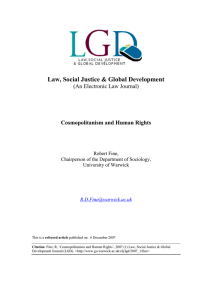Monday, July 12, 2010
advertisement
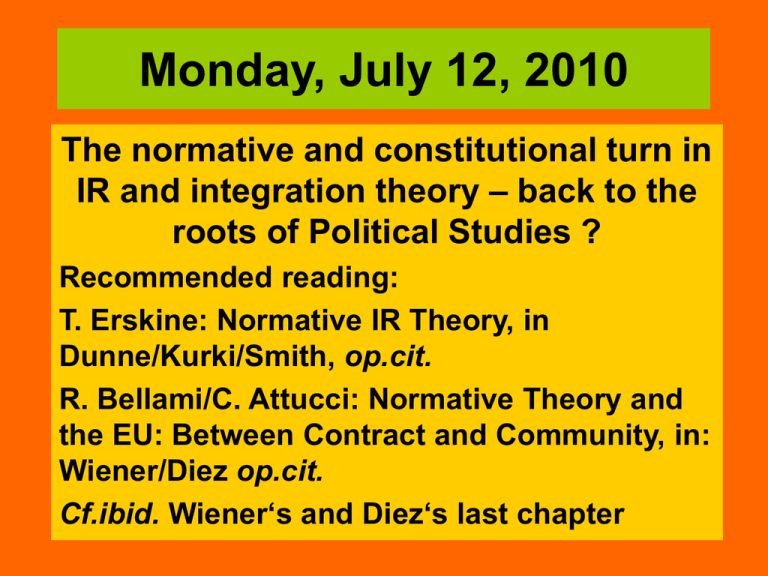
Monday, July 12, 2010 The normative and constitutional turn in IR and integration theory – back to the roots of Political Studies ? Recommended reading: T. Erskine: Normative IR Theory, in Dunne/Kurki/Smith, op.cit. R. Bellami/C. Attucci: Normative Theory and the EU: Between Contract and Community, in: Wiener/Diez op.cit. Cf.ibid. Wiener‘s and Diez‘s last chapter Normative theory • Normative theory was out of fashion for decades because of the dominance of positivism, which portrayed it as ‘valueladen’ and ‘unscientific’. • In the last fifteen years or so there has been a resurgence of interest in normative theory. It is now more widely accepted that all theories have normative assumptions either explicitly or implicitly. Normative theory • The key distinction in normative theory is between cosmopolitanism and communitarianism. The former sees the bearers of rights and obligations as individuals; the latter sees them as being the community (usually the state). • Main areas of debate in contemporary normative theory include the autonomy of the state, the ethics of the use of force, and international justice. Normative theory • In the last two decades, normative issues have become more relevant to debates about foreign policy, for example in discussions of how to respond to calls for humanitarian intervention and whether war should be framed in terms of a battle between good and evil. • F.H.Hinsley: Power and the Pursuit of Peace. Theory and Practice in the History of Relations between States (1967) • Geoffrey Best: Humanity on Warfare. The Modern History of the International Law of Armed Conflict (1980) Recommended Reading • David Boucher: Political Theories of International Relations. From Thucydides to the Present. Oxford 1998 • Ian Clark/Iver B. Neumann (eds.): Classical Theories of International Relations. Basingstoke 1996 • Beate Jahn (ed.): Classical Theory in International Relations. Cambridge 2006 Cosmopolitanism I • Cosmopolitanism is the ideology that all kinds of human ethnic groups belong to a single community based on a shared morality. This is contrasted with communitarian and particularistic theories. • ] Cosmopolitanism may entail some sort of world government or it may simply refer to more inclusive moral, economic, and/or political relationships between nations or individuals of different nations. A person who adheres to the idea of cosmopolitanism in any of its forms is called a cosmopolitan. Cosmopolitanism II • The cosmopolitan community might be based on an inclusive morality, a shared economic relationship, or a political structure that encompasses different nations. In its more positive versions, the cosmopolitan community is one in which individuals from different places (e.g. nation-states) form relationships of mutual respect. • However, the cosmopolitan community can also be understood as some kind of elite club, one based primarily on economic privilege. In this light, the cosmopolitan individual has advantages over less economically privileged individuals, advantages that might include personal and political liberties and freedoms. Cosmopolitanism III • Cosmopolitanism can be traced back to the founding father of the Cynic movement in Ancient Greece, Diogenes of Sinope(c. 412 B.C.). Diogenes, asked where he came from, answered: „I am a citizen of the world (kosmopolitês)“ This was a groundbreaking concept, because the broadest basis of social identity in Greece at that time was either the individual city-state or the Greeks (Hellenes) as a group. • The Stoics, who later took Diogenes' idea and developed it into a full blown concept, typically stressed that each human being "dwells […] in two communities – the local community of our birth, and the community of human argument and aspiration". Recommended Reading • Derek Heater: World Citizenship and Government. Cosmopolitan Ideas in the History of Western Political Thought. Basingstoke 1996 • Peter Coulmas: Weltbürger. Geschichte einer Menschheitssehnsucht.Reinbek b.Hamburg 1990 • Cornelius F. Murphy, Jr.: Theories of World Governance. A Study in the History of Ideas. Washington, D.C. 1999 • Daniele Archibugi: The Global Commonwealth of Citizens: Toward Cosmopolitan Democracy, Princeton 2008 Cosmopolitanism IV • In his 1795 essay Perpetual Peace, Immanuel Kant stages a ius cosmopoliticum (cosmopolitan law/right) as a guiding principle to protect people from war, and morally grounds this cosmopolitan right in the principle of universal hospitality. Kant claimed that the expansion of hospitality with regard to "use of the right to the earth's surface which belongs to the human race in common" would "finally bring the human race ever closer to a cosmopolitan constitution" Cosmopolitanism V • The philosophical concepts of Emmanuel Levinas, on ethics, and Jacques Derrida, on hospitality, provide a theoretical framework for the relationships between people in their everyday lives and apart from any form of written laws or codes. For Levinas, the foundation of ethics consists in the obligation to respond to the Other. • For Derrida, the foundation of ethics is hospitality, the readiness and the inclination to welcome the Other into one's home. Ethics, he claims, is hospitality. Pure, unconditional hospitality is a desire that underscores the conditional hospitality necessary in our relationships with others. Levinas's and Derrida's theories of ethics and hospitality hold out the possibility of an acceptance of the Other as different but of equal standing. Cosmopolitanism VI • Much of the political thinking of the last two centuries has taken nationalism and the framework of the sovereign nation state for granted. Now, with the advance of globalization and the increased facility of travel and communication, the political system based on the nation-state has become obsolete: it is time to design a better and more efficient alternative. • Question: how should the world political system be organized in order to maximize individual freedom and individual opportunity? Is the focus on political freedom, the absence of coercion or interference by others in personal decisions? Or, in view of the tendencies to violence and aggression that lurk in human nature, is some constraint on freedom necessary for peaceful and fruitful social interaction? The more freedom we enjoy, the better ? Communitarianism I • Communitarianism, as a group of related but distinct philosophies, began in the late 20th century, opposingindividualism. Not necessarily hostile to social liberalism or even social democracy, communitarianism emphasizes the need to balance individual rights and interests with that of the community as a whole, and argues that individual people (or citizens) are shaped by the cultures and values of their communities. Communitarianism II • Philosophical communitarianism considers classical liberalism to be ontologically and epistemologically incoherent. Unlike classical liberalism, which construes communities as originating from the voluntary acts of pre-community individuals, it emphasizes the role of the community in defining and shaping individuals, and claims that the value of community is not sufficiently recognized in liberal theories of justice. • Ideological communitarianism is a radical centrist ideology that is sometimes marked by leftism on economic issues and moralism or conservatism on social issues. . When the term is capitalized, it usually refers to the Responsive Communitarian movement of Amitai Etzioni and other philosophers. Recommended Reading • Etzioni, Amitai. "The Spirit of Community: rights, responsibilities, and the communitarian agenda". New York 1993 • http://www.amitaietzioni.org/index.shtml • http://www.gwu.edu/~ccps/ • http://plato.stanford.edu/entries/communitari anism/ “Governance” is not the same as “government.” It assumes more than just the institutions of the latter, a wider range of actors, and broader forms of regulation. Global-Governance-Architecture UN Organizations Regional Integration Projects (EU, NAFTA, etc.) International Regimes Nation State Local Politics (City Regions, Communities, etc.) Private Global Players - Multinational Companies - International Banks / Rating Agencies - Media National +Global Civil Society - NGO‘s - Interest Groups 17 - Science Adaptiert aus: Messner, Dirk (1998): Die Transformation von Staat und Politik im Globalisierungsprozeß, in: ders. (Hrsg.): Die Zukunft des Staates und der Politik. Möglichkeiten und Grenzen politischer Steuerung in der Weltgesellschaft. Bonn. “Global governance” described • Set of codified rules and regulations of transnational or global scope • Collection of authority relationships that manage, monitor or enforce said rules • Includes a variety of arrangements, including “hard law” treaties, “soft law” declarations, private orders, and international governmental organizations, and • Global policy coordination that takes place without any governance structures Strukturdeterminanten von Global Governance Problemtypen - globale öffentliche Güter grenzüberschreitende Probleme globale (Krisen-) Phänomene globale Interdependenzprobleme Systemwettbewerb Komplexität der GlobalGovernance-Architektur Leitbilder Management globaler Interdependenzen - kooperatives Global GovernanceProjekt - nationalstaatliche Interessenpolitik - regionale Blockbildung - „pooled interdependence“ - sequentielle Interdependenz - reziproke Interdependenz Macht Handlungsorientierungen der Akteure - Tausch- und Aushandlungsorientierung - Konfrontationsorientierung - gemeinsame Problemlösungsorientierung Interessenkonstellationen - Quelle: Messner 1998, 29. - Machtvakuum / polyzentrisches internationales System - asymmetrische Machtstrukturen - Veto-Macht - Stärke privater / wirtschaftlicher Macht komplementäre Interessen konvergierende Interessenkonstellationen konfliktive Interessenkonstellationen Indifferenz 20 Recommended Reading • Dirk Messner: Nationalstaaten in der Global Governance -Architektur. Wie kann das deutsche politische System Global Governance-tauglich werden? INEF- Report Heft 66/2002 • Dirk Messner /Franz Nuscheler: Das Konzept Global Governance. Stand und Perspektiven. INEF- Report Heft 67/2003 21
